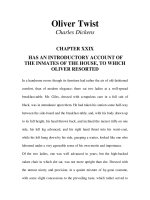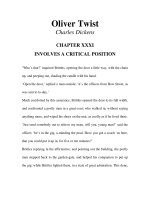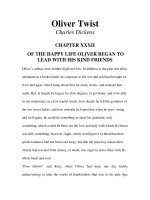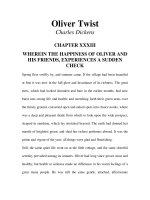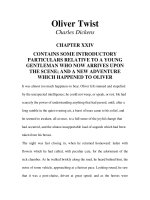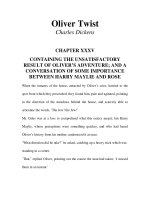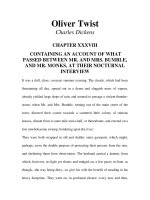Tài liệu LUYỆN ĐỌC TIẾNG ANH QUA TÁC PHẨM VĂN HỌC-Pride and Prejudice -Jane Austen -Chapter 31 pdf
Bạn đang xem bản rút gọn của tài liệu. Xem và tải ngay bản đầy đủ của tài liệu tại đây (20.58 KB, 7 trang )
Pride and Prejudice
Jane Austen
Chapter 31
Colonel Fitzwilliam’s manners were very much admired at the Parsonage,
and the ladies all felt that he must add considerably to the pleasures of their
engagements at Rosings. It was some days, however, before they received
any invitation thither—for while there were visitors in the house, they could
not be necessary; and it was not till Easter-day, almost a week after the
gentlemen’s arrival, that they were honoured by such an attention, and then
they were merely asked on leaving church to come there in the evening. For
the last week they had seen very little of Lady Catherine or her daughter.
Colonel Fitzwilliam had called at the Parsonage more than once during the
time, but Mr. Darcy they had seen only at church.
The invitation was accepted of course, and at a proper hour they joined the
party in Lady Catherine’s drawing-room. Her ladyship received them civilly,
but it was plain that their company was by no means so acceptable as when
she could get nobody else; and she was, in fact, almost engrossed by her
nephews, speaking to them, especially to Darcy, much more than to any
other person in the room.
Colonel Fitzwilliam seemed really glad to see them; anything was a
welcome relief to him at Rosings; and Mrs. Collins’s pretty friend had
moreover caught his fancy very much. He now seated himself by her, and
talked so agreeably of Kent and Hertfordshire, of travelling and staying at
home, of new books and music, that Elizabeth had never been half so well
entertained in that room before; and they conversed with so much spirit and
flow, as to draw the attention of Lady Catherine herself, as well as of Mr.
Darcy. HIS eyes had been soon and repeatedly turned towards them with a
look of curiosity; and that her ladyship, after a while, shared the feeling, was
more openly acknowledged, for she did not scruple to call out:
‘What is that you are saying, Fitzwilliam? What is it you are talking of?
What are you telling Miss Bennet? Let me hear what it is.’
‘We are speaking of music, madam,’ said he, when no longer able to avoid a
reply.
‘Of music! Then pray speak aloud. It is of all subjects my delight. I must
have my share in the conversation if you are speaking of music. There are
few people in England, I suppose, who have more true enjoyment of music
than myself, or a better natural taste. If I had ever learnt, I should have been
a great proficient. And so would Anne, if her health had allowed her to
apply. I am confident that she would have performed delightfully. How does
Georgiana get on, Darcy?’
Mr. Darcy spoke with affectionate praise of his sister’s proficiency.
‘I am very glad to hear such a good account of her,’ said Lady Catherine;
‘and pray tell her from me, that she cannot expect to excel if she does not
practice a good deal.’
‘I assure you, madam,’ he replied, ‘that she does not need such advice. She
practises very constantly.’
‘So much the better. It cannot be done too much; and when I next write to
her, I shall charge her not to neglect it on any account. I often tell young
ladies that no excellence in music is to be acquired without constant practice.
I have told Miss Bennet several times, that she will never play really well
unless she practises more; and though Mrs. Collins has no instrument, she is
very welcome, as I have often told her, to come to Rosings every day, and
play on the pianoforte in Mrs. Jenkinson’s room. She would be in nobody’s
way, you know, in that part of the house.’
Mr. Darcy looked a little ashamed of his aunt’s ill-breeding, and made no
answer.
When coffee was over, Colonel Fitzwilliam reminded Elizabeth of having
promised to play to him; and she sat down directly to the instrument. He
drew a chair near her. Lady Catherine listened to half a song, and then
talked, as before, to her other nephew; till the latter walked away from her,
and making with his usual deliberation towards the pianoforte stationed
himself so as to command a full view of the fair performer’s countenance.
Elizabeth saw what he was doing, and at the first convenient pause, turned to
him with an arch smile, and said:
‘You mean to frighten me, Mr. Darcy, by coming in all this state to hear me?
I will not be alarmed though your sister DOES play so well. There is a
stubbornness about me that never can bear to be frightened at the will of
others. My courage always rises at every attempt to intimidate me.’
‘I shall not say you are mistaken,’ he replied, ‘because you could not really
believe me to entertain any design of alarming you; and I have had the
pleasure of your acquaintance long enough to know that you find great
enjoyment in occasionally professing opinions which in fact are not your
own.’
Elizabeth laughed heartily at this picture of herself, and said to Colonel
Fitzwilliam, ‘Your cousin will give you a very pretty notion of me, and teach
you not to believe a word I say. I am particularly unlucky in meeting with a
person so able to expose my real character, in a part of the world where I had
hoped to pass myself off with some degree of credit. Indeed, Mr. Darcy, it is
very ungenerous in you to mention all that you knew to my disadvantage in
Hertfordshire—and, give me leave to say, very impolitic too—for it is
provoking me to retaliate, and such things may come out as will shock your
relations to hear.’
‘I am not afraid of you,’ said he, smilingly.
‘Pray let me hear what you have to accuse him of,’ cried Colonel
Fitzwilliam. ‘I should like to know how he behaves among strangers.’
‘You shall hear then—but prepare yourself for something very dreadful. The
first time of my ever seeing him in Hertfordshire, you must know, was at a
ball—and at this ball, what do you think he did? He danced only four
dances, though gentlemen were scarce; and, to my certain knowledge, more
than one young lady was sitting down in want of a partner. Mr. Darcy, you
cannot deny the fact.’
‘I had not at that time the honour of knowing any lady in the assembly
beyond my own party.’
‘True; and nobody can ever be introduced in a ball-room. Well, Colonel
Fitzwilliam, what do I play next? My fingers wait your orders.’
‘Perhaps,’ said Darcy, ‘I should have judged better, had I sought an
introduction; but I am ill-qualified to recommend myself to strangers.’

